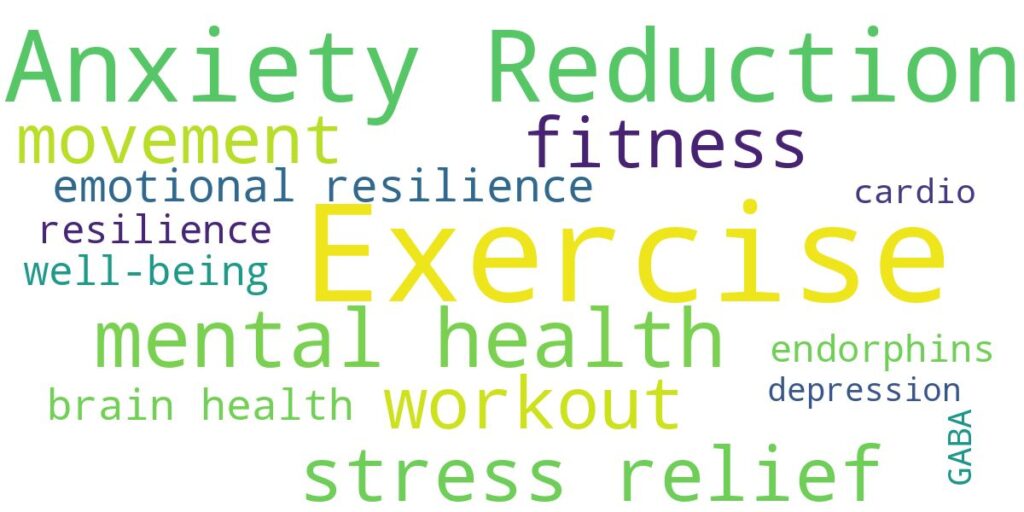You already know that exercise boosts memory, mood, and energy—but studies now show that exercise helps with anxiety too. It’s a powerful and natural way to reduce stress and improve mental well-being. We often reach for medication to manage stress and anxiety—but what if your body already held the key to emotional balance? Exercise doesn’t just benefit your physical health—it actively reshapes your brain to better handle stress, anxiety, and mood swings.
In this article, we explore how regular movement acts as a natural antidepressant, rewiring your brain and training your body to respond differently to anxiety. Whether you’re looking to supplement existing treatments or embrace a drug-free path to well-being, the science behind exercise as emotional medicine is compelling—and accessible to everyone.

Why Exercise Helps with Anxiety
When you work out, your heart rate and breathing speed up. These changes feel a lot like what happens during anxiety. But when you experience them regularly in a safe context—like during exercise—your body learns not to fear them. Over time, you become more resilient and less reactive to stress.
A Body Hack That Shows How Exercise Helps With Anxiety
So what’s the takeaway? Exercise helps with anxiety because it teaches your body not to overreact to normal physical sensations. The more you move, the more resilient your body and mind become.
Want to explore how movement supports emotional wellness too?
Read more about the social and emotional benefits of exercise here
Watch: How Exercise Changes the Brain and Eases Anxiety
This short video shows how exercise physically reshapes your brain to manage stress more effectively. It’s one of the ways exercise helps reduce anxiety and builds emotional strength over time.
Wondering How Mental Health Connects to Long-Term Health?
Explore how exercise supports healthy aging and cognitive function.
The Science Behind the Connection between Exercise and Anxiety
1. Exercise makes your brain more stress-resistant
Researchers at Princeton University found that exercise reorganizes the brain. It reduces the impact of stress and helps prevent anxiety from disrupting normal brain function.
2. Your body clock plays a bigger role than you think
Erik Herzog, PhD, a biology professor at Washington University, warns that ignoring your internal clock can have serious health effects. The World Health Organization even lists shift work as a possible carcinogen. Regular exercise, especially outdoors, can help realign your natural rhythms.
3. Neurotransmitters matter—especially GABA
GABA is a calming chemical in the brain. Anxiety is linked to an imbalance in systems like this, but regular movement and exercise may help regulate our neurobiological systems more effectively—though researchers are still exploring how this works.
4. Light, movement, and brain chemistry are connected
Studies in rats show that brain chemicals like dopamine, glutamate, and GABA follow circadian rhythms. Exercise and exposure to natural light may support these patterns, improving your mental health over time.
Conclusion: Movement Is Medicine
Exercise isn’t just about physical appearance—it’s a powerful tool for mental and emotional well-being. As the research shows, consistent movement reshapes the brain, calms the nervous system, and helps us respond to stress with greater ease and resilience. Whether you’re managing anxiety, enhancing your mood, or simply looking for a healthier way to cope with life’s pressures, incorporating regular exercise into your routine can be a game changer.
“Exercise is the most transformative thing you can do for your brain today.”
— Dr. Wendy Suzuki, neuroscientist and author of Healthy Brain, Happy Life
Ready to Feel Better—Inside and Out?
At Pledge To Fitness®, our Personal Training, Massage Therapy, and Nutrition Coaching programs are designed to help you reclaim your energy, passion, and motivation—in body, mind, and spirit.
Get Started for Free—No Risk
Book your free session today:
✔ In-depth body assessment
✔ Coaching session
✔ Meal plans tailored to your goals
FAQ
Yes. Regular physical activity has been shown to reduce symptoms of anxiety by calming the nervous system, improving mood, and building mental resilience. Exercise increases brain chemicals like GABA and endorphins that help regulate stress and emotional response.
Aerobic exercises like walking, jogging, swimming, or cycling are especially effective. However, strength training and yoga have also been shown to reduce anxiety and improve mental well-being.
For some people, exercise can be a helpful alternative or complement to medication. It’s important to speak with a healthcare provider before making any changes to your treatment plan. But research shows that exercise helps with anxiety in a natural, low-risk way.



